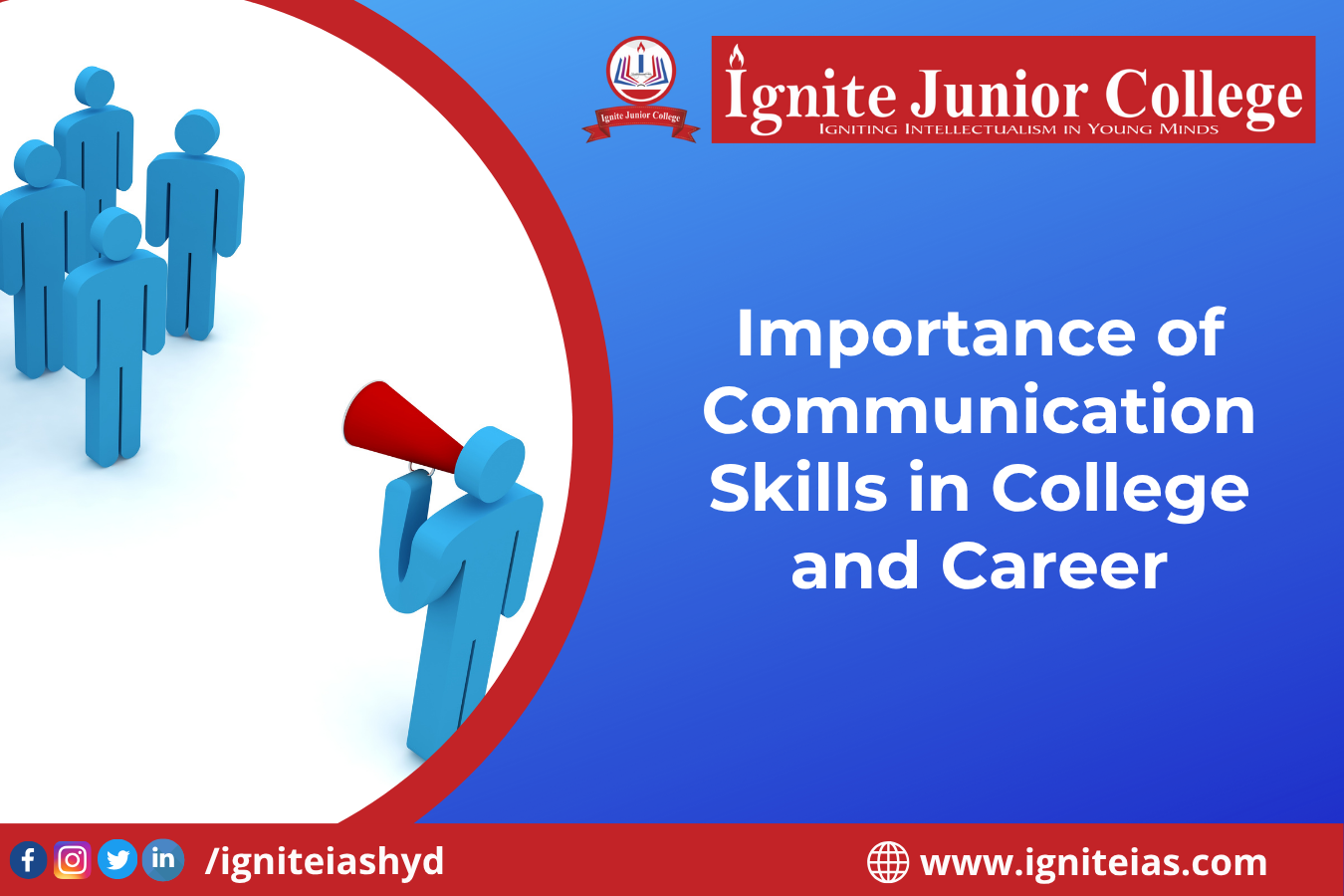Introduction
Let’s be honest—when we think about what it takes to succeed in college or crack competitive exams, what comes to mind? Probably long study hours, tough textbooks, and sleepless nights. But there’s something equally important that often gets overlooked—communication skills.
Yes, those seemingly simple skills like speaking clearly, listening actively, writing emails, or even just introducing yourself confidently can shape your academic success and future career. At Ignite Junior College, the Best Junior College in Hyderabad along with Competitive Exams preparation, we believe that strong communication skills are not just an add-on—they’re a core part of your success journey.
Let’s dive into why mastering communication is one of the smartest moves you can make right now.
Table of Contents
| Sr# | Headings |
|---|---|
| 1 | What Are Communication Skills, Really? |
| 2 | Why Communication Skills Matter in Junior College |
| 3 | Speaking Skills: More Than Just Talking |
| 4 | Listening: The Silent Power |
| 5 | Writing Skills for Academic and Professional Success |
| 6 | Body Language and Non-Verbal Cues |
| 7 | Communication in Group Discussions and Interviews |
| 8 | Public Speaking: A Fear or a Strength? |
| 9 | Role of Communication in Competitive Exam Preparation |
| 10 | Communication and Peer Relationships in College |
| 11 | How Strong Communication Builds Confidence |
| 12 | Real-Life Examples of Career Success Through Communication |
| 13 | How Ignite Junior College Develops These Skills |
| 14 | Communication Skills and Leadership Development |
| 15 | Tips to Improve Your Communication Starting Today |
1. What Are Communication Skills, Really?
Communication skills aren’t just about speaking fluently in English or giving long speeches. It’s about how well you express your ideas, understand others, and build meaningful connections—whether through speech, writing, gestures, or even silence. Think of it as the bridge that connects your thoughts to the world around you.
2. Why Communication Skills Matter in Junior College
Junior college is the phase where students transition from school life to adulthood. It’s where you’re expected to start thinking like a professional. Good communication helps:
- Understand lessons better
- Ask questions confidently
- Collaborate with peers
- Present projects effectively
At Ignite Junior College, students are constantly encouraged to voice their thoughts, which in turn strengthens their clarity and self-expression.
3. Speaking Skills: More Than Just Talking
You’ve heard the phrase, “It’s not what you say, but how you say it.” Speaking clearly, confidently, and concisely can make a lasting impression—whether in a classroom discussion, an entrance exam interview, or a job placement round.
Tips to develop speaking skills:
- Practice in front of a mirror
- Record yourself and listen
- Join speaking clubs or debate teams
- Start small—like asking a question in class
4. Listening: The Silent Power
Ever had a conversation where you could tell the other person wasn’t really listening? Annoying, right?
Listening is as important as speaking. It shows respect, helps you learn faster, and improves your response quality. At Ignite, active listening is taught through activities that train students to understand and process information better—a key skill during competitive exams.
5. Writing Skills for Academic and Professional Success
Writing well isn’t just about grammar. It’s about organizing your thoughts, making arguments clear, and being persuasive. In college, it helps in:
- Essay writing
- Report submission
- Emails to teachers or organizations
Later, it plays a role in résumé building, cover letters, and workplace communication.
Ignite Junior College regularly organizes writing challenges and assignments that help students sharpen their academic and professional writing.
6. Body Language and Non-Verbal Cues
Did you know that over 70% of communication is non-verbal? Your posture, eye contact, gestures, and even the way you walk into a room can say a lot about your confidence.
At Ignite, students learn to be aware of their body language through role-playing exercises and real-time feedback from mentors.
7. Communication in Group Discussions and Interviews
Group discussions (GDs) and personal interviews (PIs) are a big part of competitive exams and campus placements. Communication skills are your biggest ally here.
What matters most?
- Listening without interrupting
- Expressing points clearly
- Respecting different opinions
- Being assertive, not aggressive
We conduct regular mock GDs and interviews at Ignite to prepare students for real-world scenarios.
8. Public Speaking: A Fear or a Strength?
Glossophobia—the fear of public speaking—is more common than fear of heights! But imagine being the one who stands up, speaks out, and impresses everyone in a room full of competitors or recruiters.
Ignite helps students overcome this fear through:
- Anchoring opportunities in events
- Debate and extempore contests
- Soft skills sessions with experts
With practice, fear turns into fluent power.
9. Role of Communication in Competitive Exam Preparation
You might think exams like JEE or NEET don’t need communication skills—but think again. When concepts are tough, the ability to ask the right questions, discuss with peers, or explain a solution out loud can boost your understanding.
Moreover, for exams like UPSC, CLAT, or IPMAT, language and articulation are direct evaluation parameters.
10. Communication and Peer Relationships in College
A college without communication is like a phone without signal—no connection.
Building friendships, working in teams, resolving conflicts—all of this depends on how you communicate with your peers. Strong relationships are built on empathy, clarity, and respect—skills that communication enhances.
11. How Strong Communication Builds Confidence
When you speak well, people listen. And when people listen, you feel heard. This positive cycle boosts your self-worth and makes you more confident in every area—be it academics, interviews, or leadership roles.
At Ignite, we don’t just focus on how you study, but how you speak up for yourself.
12. Real-Life Examples of Career Success Through Communication
Let’s look at two imaginary but relatable examples:
Arjun, a brilliant student with top marks, couldn’t explain his thoughts in an interview. He missed out on a top B-school seat.
Sneha, on the other hand, had average scores but spoke with clarity and confidence. She bagged a role in a top company because she could communicate her ideas effectively.
See the difference? Communication can tip the scale in your favor.
13. How Ignite Junior College Develops These Skills
Ignite Junior College, the Best Junior College in Hyderabad along with Competitive Exams preparation, has a unique model:
- Weekly communication workshops
- Guest sessions by industry experts
- Mock interviews and presentation rounds
- Integrated English and soft-skills curriculum
- Feedback-driven growth models
This structured yet flexible approach helps students unlock their full potential.
14. Communication Skills and Leadership Development
Every leader you admire—be it a CEO, teacher, or public figure—has one thing in common: great communication skills.
At Ignite, leadership opportunities like class representative roles, event management, or editorial boards give students a chance to practice real-time communication—building not just leaders, but communicative changemakers.
15. Tips to Improve Your Communication Starting Today
You don’t need a big stage or a spotlight to start working on communication. Start with these simple steps:
- Speak English at home or with friends for 15 minutes daily
- Watch TED Talks and observe how speakers present ideas
- Read one news article aloud every day
- Maintain a “daily talk journal” recording your progress
- Practice eye contact and smiling during conversations
Small steps, big difference.
Conclusion
In today’s fast-paced, hyper-competitive world, communication is not optional—it’s essential. Whether you want to crack an entrance test, lead a team, or build lifelong relationships, your ability to express and connect will be the foundation.
At Ignite Junior College, we prepare you not just for exams, but for life. That’s why we are proud to be known as the Best Junior College in Hyderabad along with Competitive Exams preparation. Because we know marks matter, but your voice matters more.
Frequently Asked Questions (FAQs)
1. Why are communication skills important for college students?
Because they help students express ideas clearly, collaborate better, perform well in interviews, and build relationships.
2. Can strong communication skills help in cracking competitive exams?
Yes! Especially in group discussions, interviews, and verbal reasoning sections. It also helps clarify and retain concepts better.
3. How does Ignite Junior College teach communication skills?
Through structured programs, workshops, mock interviews, and real-life simulations as part of its regular curriculum.
4. Is English fluency necessary for good communication?
Not necessarily. What matters is clarity, confidence, and understanding. English is a tool, but communication is the craft.
5. Can introverted students also become good communicators?
Absolutely! Communication is a skill that can be learned with practice, even if you’re naturally shy or reserved.



